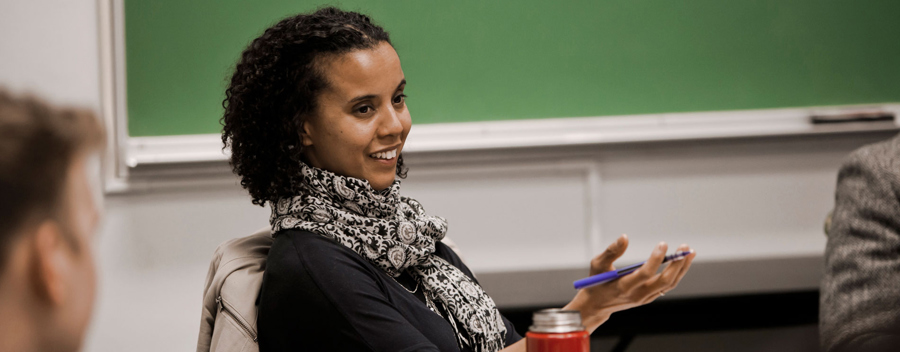
Law School receives top ranking for practical training, clinics provide pro bono services, and students help swing court decision.
Brooklyn Law Ranked 16th for Practical Training
The National Jurist lists the Law School in its top 20 for the third consecutive year.
For the third consecutive year, The National Jurist ranked Brooklyn Law School as a top 20 law school in the United States for practical training—the highest-ranked law school in New York. The rankings are based on experiential learning opportunities, with data from the American Bar Association and individual law schools, emphasizing categories that include clinics, externships, simulation courses, interschool competitions, and pro bono opportunities.
— Prof. Stacy Caplow
Taking an externship or clinic is a requirement for every student at Brooklyn Law School. With New York City as the extended campus, students have countless opportunities to get real-world experiences in courthouses, government agencies, nonprofits, law offices, and local businesses. They also can choose from among 25 in-house and “hybrid” in-house clinics, in which the Law School partners with an outside office or agency. Students represent asylum seekers, secure benefits for adults with intellectual disabilities, advise new media startups, assist small businesses, find relief for individuals in economic distress, mediate disputes in courts, and represent defrauded investors in securities arbitrations.
“Brooklyn Law School cares about preparing students to be effective, confident professionals,” said Professor Stacy Caplow, associate dean of professional legal education. “We provide unlimited opportunities so that every student, regardless of his or her area of interest, can see the law come to life, learning the skills that will ensure their successful legal careers.”
Clinics Provide Pro Bono Services
Students gain transactional skills while supporting social justice and affordable housing initiatives.
Last fall, students in the Urban Economic Development Clinic—Monica Martini ’16, Valerie Geffrard ’17, and Brian Gilbert ’17—provided transactional legal assistance to the Precedential Group, a local organization working to reduce gun violence in Brooklyn neighborhoods by engaging young people, local police, schools, and residents. Under the supervision of the clinic’s director, Professor Ted De Barbieri ’08, the three Brooklyn Law School students helped the group incorporate in New York by drafting bylaws and counseling the leaders on related business law issues
The Precedential Group was founded in 2014 by Marlon Peterson, who was recognized as a Power 100 Honoree by Ebony Magazine. He recently received the Soros Fellowship Award from Open Society Foundations. The group receives office space and funding from the Brooklyn Accelerator Incubator Project at the Brooklyn Community Foundation, a nonprofit that works to build the capacity of up to three small, innovative organizations dedicated to sparking change for a more fair and just Brooklyn.
“The Urban Economic Development Clinic is thrilled to help students gain transactional skills while supporting emerging Brooklyn-based nonprofit organizations,” De Barbieri said. Meanwhile, students in the Corporate and Real Estate Clinic provided free legal assistance to individuals living in financially distressed low-income cooperatives across New York City. They conducted loan closings as borrowers’ counsel, which in turn enabled the co-ops to pay delinquent real estate and water charges and, in one project, to complete crucial rehabilitation. In deals totaling $1.9 million, the students helped draft board resolutions, negotiate loan documents, obtain subordinations, review title reports, and resolve issues for buildings in Inwood, the Bronx, and Harlem. The students involved were Benjamin P. Chananie ’16, Shea Cunningham ’16, Alexandra C. Kuykendall ’16, Jack L. Rukab ’16, Shelbey S. Tamayo ’16, Jennifer L. Gesualdi ’17, Shawn R. Sinclair ’17, and Jonathan S. Wong ’17.
Students Help Swing Court Decision
With legal assistance from the Law School, a man with Down syndrome maintains his rights.
A 29-year -old man with Down syndrome has maintained his right to marry and start a family, thanks in large part to the work of the Disability and Civil Rights Clinic (previously known as the Advocates for Adults with Intellectual and Developmental Disabilities), directed by Professor Natalie Chin.
In late 2015, Brooklyn Surrogate Court Judge Margarita López Torres denied a guardianship petition sought by family members of the man, “D.D.,” ruling that his family’s objection to his marriage was an insufficient basis for appointing them guardians. In response to the family’s request for an Article 17-A guardianship, the judge appointed a guardian ad litem from the Law School’s Disability and Civil Rights Legal Clinic, which provided an 18-page report based on interviews with D.D., his family, his coworkers, and his friends.
“In an Article 17-A proceeding, the person for whom the guardianship is proposed has no due process rights at all,” Chin told the New York Law Journal. “In an Article 17-A the person loses all their autonomy, the right to vote, the ability to marry, [the right] to have a say in healthcare and financial matters.”
Chin said the courts don’t have the resources to do what the legal clinic can do “because there are no funds available to pay for a guardian ad litem.”
The Disability and Civil Rights Legal Clinic was established in 2014 with a $1 million grant from the Taft Foundation through the efforts of Howard Rothman ’71. It offers students an opportunity to address the pressing legal needs of adults with intellectual and developmental disabilities and their families by providing direct legal representation in securing government benefits and services, health and financial planning, and the protection of due process rights in housing, employment, and education. The clinic also undertakes policy initiatives, provides advice, and disseminates information to individuals and institutions about the legal environment that service providers must navigate.